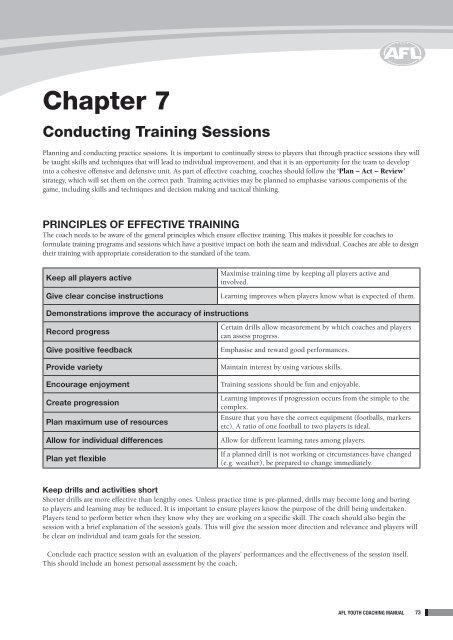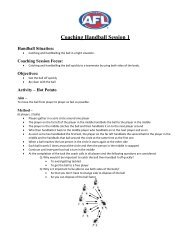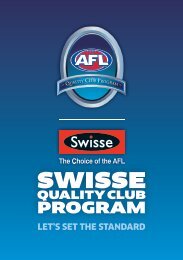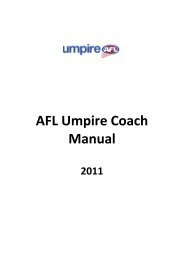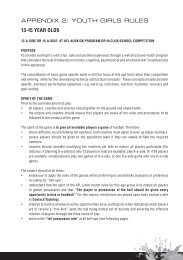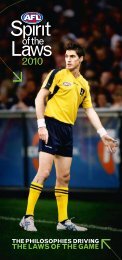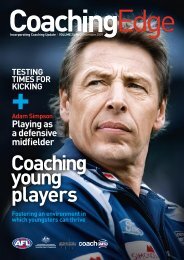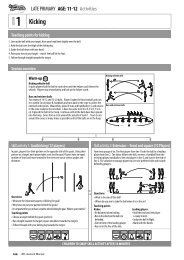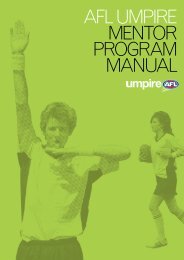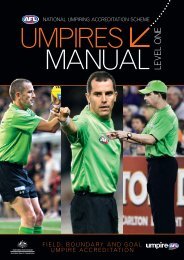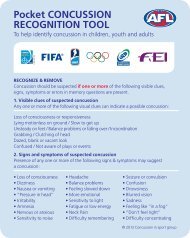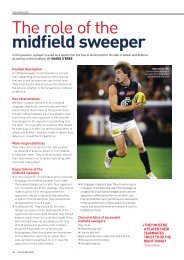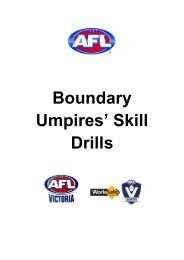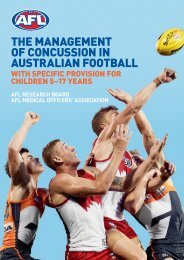2012 Youth Coaching Manual - AFL Community
2012 Youth Coaching Manual - AFL Community
2012 Youth Coaching Manual - AFL Community
Create successful ePaper yourself
Turn your PDF publications into a flip-book with our unique Google optimized e-Paper software.
Chapter 7<br />
Conducting Training Sessions<br />
Planning and conducting practice sessions. It is important to continually stress to players that through practice sessions they will<br />
be taught skills and techniques that will lead to individual improvement, and that it is an opportunity for the team to develop<br />
into a cohesive offensive and defensive unit. As part of effective coaching, coaches should follow the ‘Plan – Act – Review’<br />
strategy, which will set them on the correct path. Training activities may be planned to emphasise various components of the<br />
game, including skills and techniques and decision making and tactical thinking.<br />
Principles of effective training<br />
The coach needs to be aware of the general principles which ensure effective training. This makes it possible for coaches to<br />
formulate training programs and sessions which have a positive impact on both the team and individual. Coaches are able to design<br />
their training with appropriate consideration to the standard of the team.<br />
Keep all players active<br />
Give clear concise instructions<br />
Maximise training time by keeping all players active and<br />
involved.<br />
Learning improves when players know what is expected of them.<br />
Demonstrations improve the accuracy of instructions<br />
Record progress<br />
Give positive feedback<br />
Provide variety<br />
Encourage enjoyment<br />
Create progression<br />
Plan maximum use of resources<br />
Allow for individual differences<br />
Plan yet flexible<br />
Certain drills allow measurement by which coaches and players<br />
can assess progress.<br />
Emphasise and reward good performances.<br />
Maintain interest by using various skills.<br />
Training sessions should be fun and enjoyable.<br />
Learning improves if progression occurs from the simple to the<br />
complex.<br />
Ensure that you have the correct equipment (footballs, markers<br />
etc). A ratio of one football to two players is ideal.<br />
Allow for different learning rates among players.<br />
If a planned drill is not working or circumstances have changed<br />
(e.g. weather), be prepared to change immediately.<br />
Keep drills and activities short<br />
Shorter drills are more effective than lengthy ones. Unless practice time is pre-planned, drills may become long and boring<br />
to players and learning may be reduced. It is important to ensure players know the purpose of the drill being undertaken.<br />
Players tend to perform better when they know why they are working on a specific skill. The coach should also begin the<br />
session with a brief explanation of the session’s goals. This will give the session more direction and relevance and players will<br />
be clear on individual and team goals for the session.<br />
Conclude each practice session with an evaluation of the players’ performances and the effectiveness of the session itself.<br />
This should include an honest personal assessment by the coach.<br />
<strong>AFL</strong> <strong>Youth</strong> <strong>Coaching</strong> <strong>Manual</strong><br />
73


